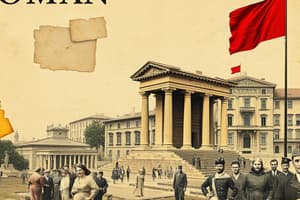Podcast
Questions and Answers
Quel était le critère principal pour être recensé comme citoyen à Rome?
Quel était le critère principal pour être recensé comme citoyen à Rome?
- Posséder un grand patrimoine
- Être un immigrant
- Avoir sa domus dans l’une des tribus (correct)
- Être un patricien
Tous les citoyens romains avaient des droits et des devoirs égaux.
Tous les citoyens romains avaient des droits et des devoirs égaux.
False (B)
Quelles étaient les trois tribus primitives à Rome?
Quelles étaient les trois tribus primitives à Rome?
Étrusques, Sabins, Latins
Les citoyens romains bénéficiaient du _______ pour servir comme militaires.
Les citoyens romains bénéficiaient du _______ pour servir comme militaires.
Associez les termes suivants avec leur définition correcte:
Associez les termes suivants avec leur définition correcte:
Quelle est la relation entre Numa et Jupiter?
Quelle est la relation entre Numa et Jupiter?
Fides est la déesse de la guerre et de l'autorité.
Fides est la déesse de la guerre et de l'autorité.
Quel est le rôle d'Egérie pour Numa?
Quel est le rôle d'Egérie pour Numa?
La tradition de la poignée de main vient du fait que Fides est _____ .
La tradition de la poignée de main vient du fait que Fides est _____ .
Associez chaque terme avec sa définition appropriée :
Associez chaque terme avec sa définition appropriée :
Comment Rome déclare-t-elle la guerre?
Comment Rome déclare-t-elle la guerre?
Le bouclier tombé du ciel est un cadeau de Mars pour les Romains.
Le bouclier tombé du ciel est un cadeau de Mars pour les Romains.
Quel est le symbole de l'élévation sociale à Rome?
Quel est le symbole de l'élévation sociale à Rome?
Quelles étaient les deux puissances politiques majeures que Rome a rencontrées au IIIe siècle?
Quelles étaient les deux puissances politiques majeures que Rome a rencontrées au IIIe siècle?
La victoire à la pyrrhus a été un succès décisif pour les cités grecques.
La victoire à la pyrrhus a été un succès décisif pour les cités grecques.
Quel roi a été appelé par les cités grecques pour impressionner les Romains avec des éléphants?
Quel roi a été appelé par les cités grecques pour impressionner les Romains avec des éléphants?
La première province de Rome, gouvernée par un proconsul, était la __________.
La première province de Rome, gouvernée par un proconsul, était la __________.
Quelle a été la durée de la première guerre punique?
Quelle a été la durée de la première guerre punique?
Associez chaque événement à sa description appropriée:
Associez chaque événement à sa description appropriée:
Rome a eu un avantage décisif grâce à la rivalité entre patriciens et plébéiens.
Rome a eu un avantage décisif grâce à la rivalité entre patriciens et plébéiens.
Quel était l'objectif principal de Rome en transformant les populations italiennes en alliés?
Quel était l'objectif principal de Rome en transformant les populations italiennes en alliés?
Quelle est la première partie de la formule juridique?
Quelle est la première partie de la formule juridique?
Le demandeur doit toujours solliciter une condamnation dans la formule.
Le demandeur doit toujours solliciter une condamnation dans la formule.
Quel est le rôle de la partie 'Intentio' dans la formule?
Quel est le rôle de la partie 'Intentio' dans la formule?
Le prêteur peut insérer une ______ entre l'Intentio et la Condemnatio.
Le prêteur peut insérer une ______ entre l'Intentio et la Condemnatio.
Qui fixe le pouvoir du juge de déclarer la demande comme fondée ou non?
Qui fixe le pouvoir du juge de déclarer la demande comme fondée ou non?
Les exceptions de dol et de violence ne peuvent pas être soulevées par le défendeur.
Les exceptions de dol et de violence ne peuvent pas être soulevées par le défendeur.
Quel est un exemple de question que pourrait poser l'Intentio?
Quel est un exemple de question que pourrait poser l'Intentio?
Associez chaque terme avec sa définition:
Associez chaque terme avec sa définition:
Quelle action est fondée sur un contrat consensuel de vente?
Quelle action est fondée sur un contrat consensuel de vente?
L'intentio d'une action personnelle mentionne uniquement le nom du demandeur.
L'intentio d'une action personnelle mentionne uniquement le nom du demandeur.
Quelle est la différence principale entre les actions réelles et personnelles?
Quelle est la différence principale entre les actions réelles et personnelles?
Une action qui consiste à déterminer par des bornes les limites d'une propriété est appelée action en _____ .
Une action qui consiste à déterminer par des bornes les limites d'une propriété est appelée action en _____ .
Associez chaque type d'action avec son objet:
Associez chaque type d'action avec son objet:
Le droit romain reconnaît-il la prescription acquisitive?
Le droit romain reconnaît-il la prescription acquisitive?
Le préteur utilise une demonstratio pour toutes les actions civiles.
Le préteur utilise une demonstratio pour toutes les actions civiles.
Quelles sont les trois actions civiles qui incluent l'adjudicatio?
Quelles sont les trois actions civiles qui incluent l'adjudicatio?
Qui a empoisonné Claude ?
Qui a empoisonné Claude ?
Néron a été un empereur connu pour sa générosité et sa bienveillance.
Néron a été un empereur connu pour sa générosité et sa bienveillance.
Quel est le nom du premier empereur de la dynastie julio-claudienne ?
Quel est le nom du premier empereur de la dynastie julio-claudienne ?
Caligula voulait nommer son cheval consul et cela montre sa __________.
Caligula voulait nommer son cheval consul et cela montre sa __________.
Associez les empereurs aux événements marquants.
Associez les empereurs aux événements marquants.
Quel philosophe est cité comme guide du tyran par Néron ?
Quel philosophe est cité comme guide du tyran par Néron ?
L'année 69 a vu la succession de trois empereurs éphémères : Galba, Othon, et Vitellius.
L'année 69 a vu la succession de trois empereurs éphémères : Galba, Othon, et Vitellius.
Quel était le nom du fils de Vespasien qui lui a succédé ?
Quel était le nom du fils de Vespasien qui lui a succédé ?
Flashcards
Citoyen-soldat à Rome
Citoyen-soldat à Rome
Le régime du citoyen-soldat à Rome désignait les citoyens comme des membres de l'assemblée avec des droits et devoirs égaux, soulignant leur implication dans l'armée.
L'importance du domicile à Rome
L'importance du domicile à Rome
La domiciliation était un élément crucial de l'identité romaine, permettant à un individu d'être recensé et d'appartenir à l'une des 3 tribus de Rome.
Le recensement sous Servius
Le recensement sous Servius
Le recensement romain établi par Servius différenciait les citoyens en fonction de leur patrimoine, marquant une rupture avec l'égalité initiale entre les patriciens.
Les plébéiens à Rome
Les plébéiens à Rome
Signup and view all the flashcards
Les tribus romaines et les droits des habitants
Les tribus romaines et les droits des habitants
Signup and view all the flashcards
Jupiter
Jupiter
Signup and view all the flashcards
Numa Pompilius
Numa Pompilius
Signup and view all the flashcards
Guerre pieuse et juste
Guerre pieuse et juste
Signup and view all the flashcards
Fides
Fides
Signup and view all the flashcards
Egérie
Egérie
Signup and view all the flashcards
Le bouclier sacré
Le bouclier sacré
Signup and view all the flashcards
L'élévation sociale romaine
L'élévation sociale romaine
Signup and view all the flashcards
Réforme judiciaire de Numa Pompilius
Réforme judiciaire de Numa Pompilius
Signup and view all the flashcards
Conquête de l'Italie et expansion romaine
Conquête de l'Italie et expansion romaine
Signup and view all the flashcards
Alliance entre Carthage et la Sicile
Alliance entre Carthage et la Sicile
Signup and view all the flashcards
Victoire à la Pyrrhus
Victoire à la Pyrrhus
Signup and view all the flashcards
Guerres puniques
Guerres puniques
Signup and view all the flashcards
Développement de la marine romaine
Développement de la marine romaine
Signup and view all the flashcards
Intégration des populations italiennes
Intégration des populations italiennes
Signup and view all the flashcards
La première province romaine
La première province romaine
Signup and view all the flashcards
Affaiblissement de Carthage et expansion romaine
Affaiblissement de Carthage et expansion romaine
Signup and view all the flashcards
Le Droit
Le Droit
Signup and view all the flashcards
Intentio
Intentio
Signup and view all the flashcards
Condemnatio
Condemnatio
Signup and view all the flashcards
Exceptio
Exceptio
Signup and view all the flashcards
Réplique à l'exceptio
Réplique à l'exceptio
Signup and view all the flashcards
Actions de bonne foi
Actions de bonne foi
Signup and view all the flashcards
Actions de droit strict
Actions de droit strict
Signup and view all the flashcards
Apud iudicem ou in iudico
Apud iudicem ou in iudico
Signup and view all the flashcards
Qu'est-ce que la demonstratio ?
Qu'est-ce que la demonstratio ?
Signup and view all the flashcards
Pourquoi la demonstratio est-elle importante ?
Pourquoi la demonstratio est-elle importante ?
Signup and view all the flashcards
Quelles sont les actions utilisant une aduidicatio ?
Quelles sont les actions utilisant une aduidicatio ?
Signup and view all the flashcards
Quelle est la différence entre les actions réelles et les actions personnelles ?
Quelle est la différence entre les actions réelles et les actions personnelles ?
Signup and view all the flashcards
Quel est le contenu de l'intentio d'une action réelle?
Quel est le contenu de l'intentio d'une action réelle?
Signup and view all the flashcards
Quel est le contenu de l'intentio d'une action personnelle?
Quel est le contenu de l'intentio d'une action personnelle?
Signup and view all the flashcards
A quoi sert la procédure formulaire ?
A quoi sert la procédure formulaire ?
Signup and view all the flashcards
Existe-t-il une prescription acquisitive en droit romain ?
Existe-t-il une prescription acquisitive en droit romain ?
Signup and view all the flashcards
Le règne de Caligula
Le règne de Caligula
Signup and view all the flashcards
L'accession au pouvoir de Claude
L'accession au pouvoir de Claude
Signup and view all the flashcards
Le règne de Néron
Le règne de Néron
Signup and view all the flashcards
La fin du règne de Néron
La fin du règne de Néron
Signup and view all the flashcards
L'année des quatre empereurs
L'année des quatre empereurs
Signup and view all the flashcards
Le règne de Vespasien
Le règne de Vespasien
Signup and view all the flashcards
Le règne de Titus et la succession de Domitien
Le règne de Titus et la succession de Domitien
Signup and view all the flashcards
La fin du règne de Domitien et le début de la dynastie des Antonins
La fin du règne de Domitien et le début de la dynastie des Antonins
Signup and view all the flashcards
Study Notes
Introduction to Roman Law
- Roman law is a collection of legal rules that governed individuals and institutions under Roman political power for over two thousand years, from the legendary founding of Rome to the fall of the Byzantine Empire.
- The first millennium saw centralized power in Rome, evolving to centralized power in Byzantium after 330 CE.
- The second millennium saw Rome lose its political power in 476 CE, yet Roman law continued to develop.
Roman Law - Object, Subject or Positive Law
- Roman Law refers to the set of rules governing the behaviour of those who were under Roman political authority.
- Object Law: The body of rules guiding societal behaviour, encompassing rights and duties.
- Subject Law: Individual rights and immunities recognized by object law.
- Positive law: The current applicable rules at a given time in a given place.
Limits of the Chronological Scope of Roman Law
- Rome's founding is dated to 753 BCE (ab urbe condita) according to historical writing and legendary accounts of the city.
- The key periods of Roman law development are from the middle of the 2nd century before Christ until the middle of the 3rd century after Christ.
- Key figures and periods of Roman history are explored in relation to law.
Legends of Rome
- The founding of Rome is surrounded by legends of Romulus and Remus. Historical and archaeological evidence supports the founding, despite the legendary stories.
- The Judgement of Paris is explored, a mythological story that led to the Trojan war.
- The key concept of hospitality is discussed in relation to the Trojan war.
The Foundation of Rome
- Historical/legendary figures like Romulus and Remus are linked to the beginning of Roman political life.
- Historical writings like Varron, Titus Livy, and the Romans of Halicarnassus date Rome's founding to April 21, 753 BCE.
- Ancient legends and historical accounts are mentioned as sources for information on Rome and its development; however, these are also recognized as not being entirely accurate and possibly mixed with legend and myth. A conclusion is also reached that some legends may not be completely accurate/reliable.
The Legend
- In the beginning, people attributed natural events to supernatural forces (divine beings) they could not explain.
- The people attempted to appease the gods through rituals such as sacrifice. Temples were created.
- The myth of the Judgement of Paris is explored (involving a golden apple and the dispute between goddesses).
- The legend of the founding of Rome is important for understanding early legal and political concepts through exploration of the myths of Aeneas, Romulus, Remus.
The succession of Romulus
- The question of who would succeed Romulus was debated.
- Several figures, including Numa Pompilius, Tullus Hostilius, Ancus Marcius, Tarquin the Ancient, Servius Tullius, and Tarquin the Proud are discussed in terms of the development of Rome.
- The transition of power from the founding of Rome is followed.
The Rise of the Republic
- Roman law's growth is depicted from the monarchy to the Republic.
- The transition reflects struggles within the government and changes to political organizations linked to social conditions.
- The evolution of the Republic and its legal institutions is showcased. The main actors of the period are identified and their actions and positions described to show the importance of the era.
The Laws of the Twelve Tables
- The Twelve Tables, a collection of laws, are explored in relation to Roman legal development.
- Early Roman laws were initially customary practices, not written down until the Twelve Tables were created.
- Development and significance of the creation of written laws and how it differed from earlier eras are portrayed.
Later Republican Rome
- The challenges Rome faced in the Republic and the role of early Republican lawmakers are explored in detail.
- The Republic transitioned to an empire when Julius Caesar's authority increased dramatically at the end of the Republic.
- Exploration of the transition to the Empire highlights the influence of Julius Caesar's growing power.
The Rise of the Empire
- Julius Caesar's rise to power marks a turning point in Roman history
- The importance of military leadership and political organization are showcased in the rise of the Roman Empire.
- The role of Augustus and the establishment of the Principate are emphasized as key events in the development from republic to empire.
The High Empire
- The High Empire was an important period of Roman history characterized by relative peace and prosperity.
- The role of emperors like Augustus and the administrative changes accompanying the rise of the Roman Empire are displayed.
- The contributions of important figures like Ulpian and Papinian to Roman law during the early Empire are showcased.
The Late Empire and the Crisis of the Third Century
- The crisis of the third century featured internal conflicts, leading to the rise and fall of various emperors.
- The period of instability in the late Empire and the impact on the Roman legal system are depicted
- The difficulties and challenges endured during this period are outlined.
The Tetrarchy and the Dominate
- The transition to a more autocratic system of government is outlined.
- Diocletian's reforms, including the creation of the tetrarchy (a system of rule by four co-emperors), are discussed.
- The reorganization of the empire under Diocletian and Constantine are explored. This shift foreshadowed major changes in how Roman law would be preserved.
The Reign of Justinian
- Justinian's desire and ultimate achievement of a comprehensive collection of Roman laws are analyzed.
- The importance of Justinian's codifications (Corpus Juris Civilis) are conveyed.
- Justinian's legacy in the development of the Corpus Juris Civilis is examined; it has a major impact on law throughout history.
The Legacy of Roman Law
- The enduring impact of Roman law throughout history is discussed and it's effects on later legal systems and concepts.
- The significant influence of Roman law on legal development and its persistence as a foundational concept is highlighted.
- The unique features of Roman law that contributed to its enduring legacy are analyzed.
Studying That Suits You
Use AI to generate personalized quizzes and flashcards to suit your learning preferences.




